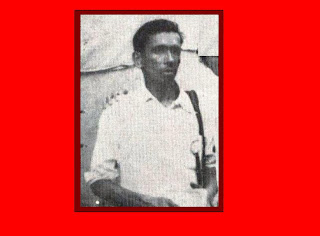(1) Aami Je Dekhechhi Sei DeshIn all probability this song was composed by
Comrade Hemanga Biswas in the 70s, maybe after his 2nd visit to China. An outstanding composition of
Comrade Biswas.
(2) Aaro Basanta Bohu Basanta Aasuk“Aaro Basanta Bohu Basanta Aasuk” was composed by
Comrade Hemanga Biswas on the eve of 70th Birth Anniversary of
Com. Mao Ze Dong. Comrade Mao’s birthday is 26-12-1893. Therefore it seems this song was composed during 1963-64. This song is rendered by
Smt. Purabi Mukhopadhyay.(3) Aajaadi Hoy Ni TorThis song was composed by
Comrade Hemanga Biswas probably in the year 1951-52 i.e. in the golden era of
IPTA. At that time he was living underground somewhere at Jayantia Hills (Meghalaya of today). The place had a musical history.
Com Biswas heard a beautiful song when he was at
Com Pravat Pal’s (one of his friends of IPTA) house. The song was about the singer discovering a beautiful flower called ‘THANIUM’ in a foreign country. The beautiful tune attracted Com Biswas and he composed
“Aajaadi Hoino Tor” based on that tune.

 at his
at his
